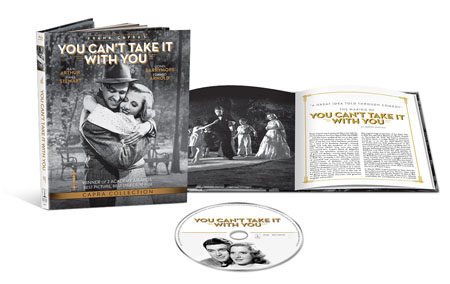
“CAN’T BUY ME LOVEâ€
By Raymond Benson
Frank
Capra was a superstar Hollywood director in the 1930s. He had a string of
critically-acclaimed and successful pictures after joining Columbia Pictures
and elevating the studio from “poverty row†to a force that competed with the
big leagues. Two of Capra’s Columbia movies won the Oscar for Best Picture, and
Capra became the first filmmaker to win the Oscar for Best Director three times, all within five years. You Can’t Take it With You was Capra’s
second Best Picture winner and his third Best Director achievement.
Sometimes
his films have been called “Capra-corn,†because they are usually steeped in
Americana, explore themes of social class inequality, feature casts of
eccentric—but lovable—protagonists and greedy, heartless villains, and contain stories
about the Everyman’s struggle against the Establishment. Capra was also one of
the developers of the screwball comedy, in which mismatched couples, usually
from different social classes, fall in and out and back in love.
You Can’t Take It
With You was
based on the Broadway play by George S. Kaufman and Moss Hart, which was still
playing in New York when the film opened. It’s a story with Capra’s classic oddball
characters—this time a whole family of them—and their clash with the moneybags
banking world (a hot topic in the Depression-weary 1930s).
“Grandpaâ€
Vanderhof (Lionel Barrymore) is the patriarch of a poor but extremely happy freedom-loving
houseful of misfits that include his daughter Penny (Spring Byington as a pulp
writer and painter) and her husband (Samuel S. Hinds, a maker of fireworks),
his granddaughter Essie (a very young Ann Miller as a would-be ballerina taking
lessons from a mad Russian instructor played by Mischa Auer) and her husband Ed
(Dub Taylor as a vibraphone player and printer), a couple of other hangers-on
who create things in the basement (Donald Meek and Halliwell Hobbes), and the
obligatory comic African-American maid and butler (Lillian Yarbo and Eddie
“Rochester†Anderson). Oh, and then there’s the other granddaughter, Alice
(Jean Arthur), who is relatively normal and works as a secretary in the big
bank building owned and run by “A.P.†Kirby (Edward Arnold), who wants to buy
Grandpa’s house and land so that he can develop on it. Grandpa is the only
holdout in the area and refuses to sell. The complication comes when Alice and
Kirby’s son Tony (James Stewart, in his first major role and first for Capra) fall
in love and want to marry. Socialite Mrs. Kirby (Mary Forbes) disapproves with
such viciousness that she practically
becomes the real villain of the piece.
Thus,
the Capra ingredients are all there—odd and funny characters, a conflict
between upper and lower classes, and a screwball romance. Add in a healthy dose
of Americana songs like “Polly Wolly Doodle†and you have a classic that in
many ways still resonates today as a cautionary tale of greed. As the title
states, you can’t take your money with you when you’re gone, so you might as
well have fun and not worry about it while you’re here on earth.
The
performances are first rate all around (although Byington received the only
Oscar nomination, for Supporting Actress), and the adaptation by Robert Riskin
is superb (despite radical changes to the third act of the play). There are
some very funny moments, such as when the Kirbys come to the Vanderhof home for
dinner on the wrong night, causing the nutty household to spring into action to
accommodate them. Familiar-face Harry Davenport has a wonderful comic turn as a
night court judge when everyone is thrown into the drunk tank for disorderly
conduct and illegal manufacture of fireworks.
And
yet, of Capra’s most well-known pictures of the 30s (It Happened One Night, Mr.
Deeds Goes to Town, Lost Horizon,
Mr. Smith Goes to Washington, and
this one), You Can’t Take It With You is
perhaps the weakest. The problem is that it’s too long, at times ponderous, and
it takes a while to get going. I do question whether or not it really was the
Best Picture of 1938—other nominees such as The
Adventures of Robin Hood, Grand
Illusion, and Boys Town may have
been more deserving. And yet, You Can’t
Take It With You is still a very good time at the movies.
Sony’s
new Blu-ray release is outstanding. The film was fully restored and mastered in
4K (1080p high definition) and looks marvelous. There’s not a blemish to
behold, and the grain is welcome. The audio is Mono DTS-HD MA with several
languages from which to choose. Supplements include an audio commentary by
Frank Capra, Jr. and author Cathrine Kellison that is well-informed and
entertaining. A 25-minute documentary, “Frank Capra, Jr. Remembers...You Can’t Take It With You†features
Capra’s son and others talking about the history behind the making of the film.
The original theatrical trailer is included, and the hard-case inner booklet
features a comprehensive and studious essay by film historian Jeremy Arnold.
Bottom
line—it’s a must for cinephiles, Capra fans, Jimmy Stewart enthusiasts, and
lovers of glorious black and white. Enjoy it... while you can.
CLICK HERE TO ORDER FROM AMAZON